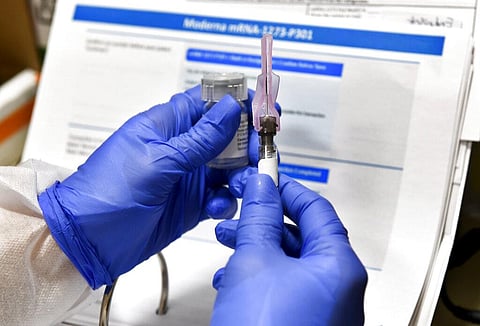

NEW DELHI: News of the successful phase 3 clinical trials of the Covid-19 vaccines being developed by US biotech firms Moderna and Pfizer has cheered the world but it may be a bit early for India to celebrate.
Pfizer along with its German partner BioNTech has already applied for emergency use authorization of its vaccine from the US drug regulator, the Food and Drug Administration, and if approved it could be available for regulated use as early as next month.
But India may not stand to benefit much, at least in the near future, either from the Pfizer-BioNTech vaccine or the one being developed by Moderna. This is because of three reasons.
Firstly, a bulk of all the vaccines being developed, Pfizer- BioNTech and Moderna included, has been pre-booked by rich countries, leaving low income countries in the cold.
Secondly, the Pfizer-BioNTech and Moderna vaccines need to be stored at extremely cold conditions, something the cold chains in India may not have the capacity to do.
The Pfizer-BioNTech Covid- 19 vaccine candidate needs to be stored at -70 degree Celsius, which is impractical in India, while the one by Moderna requires to be kept at -20 degree Celsius.
In India, most vaccines under the National Immunisation Programme, except the polio and rotavirus vaccines, need to be stored at 2-8 degree Celsius.
The polio vaccine needs to be stored at -20 but once opened it can be simply refrigerated and used within four weeks.
Storage of the Moderna vaccine, at -20, is difficult but not impossible. But the company has no immediate plans for distribution in India. Lastly, the Pfizer-BioNTech and Moderna vaccines are expensive.
While the final price is yet to be determined, they could cost up to $20-37 per dose, which may be unaffordable for the national vaccination programme.
This in effect means India will have to wait for its home grown vaccines such as the ones being developed by Bharat Biotech and Zydus, or those that are being developed here by Oxford University- AstraZeneca and Russia’s Sputnik V.
The advance booking of the vaccines by rich countries was recently highlighted by the Duke Global Health Innovation Center, US.
Its analysis earlier this month found that high-income countries and some middle-income countries had reserved 8.8 billion vaccine doses with some high-income countries booking more than required.
About 78% of the Moderna vaccine, or 500 million-1 billion doses, have been booked while 70% of the Pfizer-BioNTech vaccine had been similarly grabbed already.
Pfizer-BioNTech is getting $1.95 billion from the US government for 100 million doses while Moderna has received $2.5 billion for an undisclosed number of doses.
India has not released details of any possible deal with the vaccine companies but union health minister Harsh Vardhan said on Thursday the country may have 500 million doses of the coronavirus vaccines for about 25 crore people by June-July 2021.
Sources attached with the National Expert Group for Covid-19 Administration said even though talks are on with vaccine companies, the country’s hopes are pinned on those “made in India” or those being developed here.
‘Homegrown vaccines better bet, availablity not a problem’
Much of this volume, the expert group member said, could be vaccines by Bharat Biotech and Oxford University-Astra- Zeneca, for which the Serum Institute of India is a manufacturing partner.
“We are trying our best to ensure the speedy availability of an effective Covid-19 vaccine. Two of our homegrown vaccines, one each by Bharat Biotech and Zydus, are in phase 3 trial or about to enter the stage while two others, one by Oxford University and Russia’s Sputnik V, are also in late stage trials,” he said.
Additionally, a vaccine by Biological E was given the permission to start human trials recently. But experts said India was far better placed than most low and middle income countries, mainly because of its manufacturing capacity.
“India isn’t doing badly at all. We have two homegrown vaccines starting phase 3 and partnerships to make a couple of others. This is not a race,” said virologist Shahid Jameel.
“There will be a couple of different vaccines available in the next six months. In fact, 18 months to a vaccine instead of 10-20 years is good going,” he added.
According to epidemiologist Chandrakant Lahariya, the Serum Institute, the world’s largest vaccine maker by volume, has already started the production process and this means it could be the first vaccine available for use in India.
Senior medical scientist Gagandeep Kang was of the view that given the financial constraints and delivery logistics, the government should choose the vaccine that best serves the country’s needs.